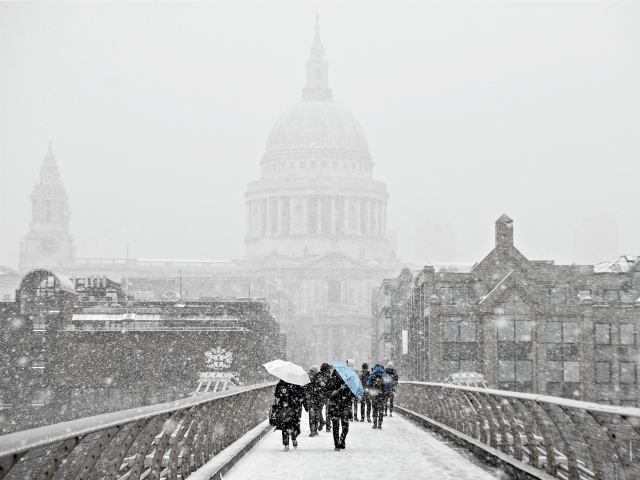Researchers from University College London are forecasting an average temperature in the UK of just 3.9ºC (39ºF) for January to February in what is expected to be “the coldest weather in 30 years.”
Yahoo News reported Saturday that temperatures in Great Britain could reach as low as -14C with “snow event after snow event” expected to hit various parts of the territory.
Forecasters expect the lasting cold spell to begin sometime this month and to continue at least through March.
“October is now looking like it will turn out to be colder than average with more of a chance of something wintery setting in through the second half of the month,” according to Exacta Weather forecaster James Madden.
“There is a strong chance of widespread frosts and the chance of snowfall which will set the scene for November,” Madden said. ““This will pave the way for what is shaping up to be a colder than average winter with some extreme cold weather events.”
“Snow events have been few and far between in recent years, but this winter is looking favourable to bring snow event after snow event as weather systems from the Atlantic clash with cold stagnated air over the UK,” he said.
Current sea temperatures combined with a weather system over the north Atlantic suggest that “a freezing vortex of Arctic air could hit the country” later this month, Yahoo’s Victoria Bell reported. The system will presumably descend from the North Pole ushering in a swath of low pressure spanning from Greenland to the northwest coast of Ireland.
In the estimation of some meteorologists, the 2019-2020 cold spell will rival the bitter winter of 1963, believed to have been the coldest in 200 years.
Other weather-watchers are less confident that this winter will be a record-breaker. Mark Saunders, for example, Professor of Climate Prediction at UCL, claims that there is only a 57 percent probability that this winter will be colder than last year’s.
Late last month, a group of over 500 scientists and climate professionals sent a “European Climate Declaration” to the Secretary-General of the United Nations appealing for an open debate on climate change.
“Climate science should be less political, while climate policies should be more scientific,” the declaration stated. “Scientists should openly address the uncertainties and exaggerations in their predictions of global warming, while politicians should dispassionately count the real benefits as well as the imagined costs of adaptation to global warming, and the real costs as well as the imagined benefits of mitigation.”
“There is no statistical evidence that global warming is intensifying hurricanes, floods, droughts and suchlike natural disasters, or making them more frequent,” they continued.
The declaration’s signers insisted that public policy must respect scientific and economic realities and not just reflect the most fashionable trend of the day.
“There is no climate emergency. Therefore, there is no cause for panic and alarm,” they noted. “We strongly oppose the harmful and unrealistic net-zero CO2 policy proposed for 2050.”
No matter what the winter shapes up to be, there is a 100 percent probability that climate alarmists will find some way to attribute the weather to global warming and carbon dioxide emissions.

COMMENTS
Please let us know if you're having issues with commenting.